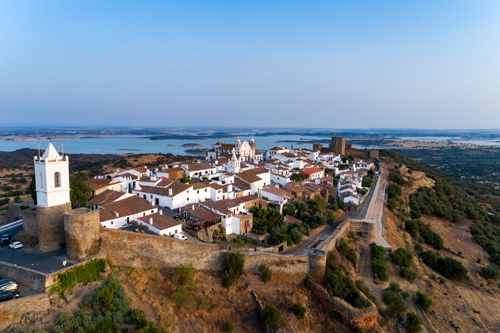About Evora
Evora, one of the best-preserved and oldest towns in Portugal, is an enchanting and lively town, brimming with history, art, culture, and outstanding cuisine.
Evora, the capital of the Alentejo region, is a beautiful town- a museum-city – with roots dating back to Roman times. Surrounded by 14th century walls and home to narrow, winding alleys, diverse and outstanding architecture, Roman antiquities, and a picturesque central square, it is one of the best preserved and oldest towns in Portugal and has been classified as a UNESCO World Heritage Site. Evora is also a lively university city, full of bars and excellent restaurants.
The town’s golden age was between the 14th and 16th centuries when many educated people and artists settled there. It became the center of arts and learning as well as the seat of the archbishop, and the Jesuit University was founded there. When Spain took control of Portugal, the royal court left Evora, and the town lost much of its importance and cultural influence but much of its architecture still stands today.
The heart of the city is Praca do Giraldo, named after the Christian knight “Fearless,” who, based on legend, stormed one of the watchtowers alone and conquered Evora from the Moors in the mid 12th century. In the center of the square is a famous Baroque fountain, declared a national monument, built in 1571 of white marble combined with bronze. It is decorated with 8 spouts shaped as lions with the number of spouts corresponding to the number of main streets connecting to the square, and there is a crown at the top. The square is surrounded by impressive historic buildings, cafes, and beautiful shops. Praca do Giraldo, which is beautifully illuminated after dark, is the center of Evora's nightlife.
The Evora Cathedral, the Se, is a fortress-looking church dating back to the early 13th century which combines Romanesque and Gothic architectural features. It is one of the largest churches in Portugal and is adorned with two asymmetrical towers that were added later. The 12 statues of the Apostles, dating back to the 14th century, stand guard at the entrance, and there is a huge, magnificent chandelier inside.
The Museum of Religious Art is housed in the connecting building, a Baroque style structure which had been home to the church’s choir boys. The museum displays rare and valuable artifacts, and there are spectacular views of the city from the top of the museum’s winding staircase.
The 15th century Igreja do Sao Francisco is a huge Manueline- Gothic style structure. Connected to the church is the 16th century chapel, Capela Dos Ossos (Bone Chapel), whose interior designs are somewhat gruesome but fascinating – its walls are lined with 5000 skulls, bones, and skeletons of monks taken from a local cemetery.
One of the highlights of the city – and its icon - is the relatively well-preserved Roman Temple, also known as the Temple to Diana. Thought to have been built in the 2nd or 3rd century, it is a granite base with 14 surviving columns and Corinthian capitals.
The Evora Museum is housed in the former palace of the Archbishop of Evora which dates back to the 16th century. The interior is light and modern, and it displays the most diverse art collection in Portugal.
The 14th century Palacio dos Duques de Cadaval, the Palace of the Dukes of Cadaval, is located at the foot of the old city wall. While it is still a private residence, there are several rooms which are open to the public and showcase valuable and fascinating family heirlooms.
The Church of St. John the Evangelist, Igreja Sao Joao Evangelista, is decorated with beautiful Azulejo tiles which depict the life of the saint.
Evora is an enchanting town, brimming with history, art, culture, and outstanding cuisine!
Popular Itineraries
Traveled by thousands
Hotels in Evora- explore rates & availability
Hilton Garden Inn Evora
Our partners
Attractions in Evora
- Evora University, Evora
- Fortifications, Evora
- Roman Temple, Evora
- Cathedral, Evora
- Historic Center, Evora
- Chapel of Bones, Evora
- Evora Museum
- Convent of Loios, Evora
- Silver Water Aqueduct, Evora
- Fountain of Moura Gate, Evora
- Carriage Museum, Evora
- Palace of the Dukes of Cadaval, Evora









